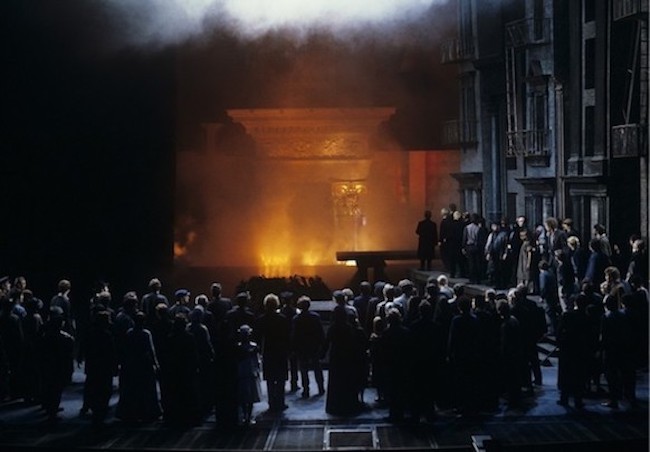
The musical work of Richard Wagner is composed of operas or “musical dramas” ranging from “Fairies” (Die Feen) to “Parsifal”. A detailed presentation of each of these major works is associated here with a set of thematic articles, placing them not only in the context of his personal life but also in his social, economic and cultural context. This section also includes all the musical works (excluding opera) and his literary work.
THE RING OF THE NIBELUNG, WWV86
Der Ring des Nibelungen, WWV86
Synopsis
Of the principal characters in the “Ring of the Nibelung,” Alberich, the Nibelung, and Wotan, the chief of the gods, are symbolic of greed for wealth and power. Thus lust leads Alberich to renounce love — the most sacred of emotions — in order that he may rob the Rhinedaughters of the Rhinegold and forge from it the ring which is to make him all-powerful. Wotan by strategy obtains the ring, but instead of returning it to the Rhinedaughter, he gives it to the giants, Fafner and Fasolt, as ransom for Freia, the goddess of youth and beauty, whom he had promised to the giants as a reward for building Walhalla. Alberich has cursed the ring and all into whose possession it may come. The giant no sooner obtain it than they fall to quarrelling over it. Fafner slays fasolt and then retires to a cave in the heart of a forest where, in the form of a dragon, he guards the ring and the rest of the treasure which Wotan wrested from Alberich and also gave to the giants as ransom for Freia. This treasure includes the tarnhelmet, a helmet made of Rhinegold, the wearer of which can assume any guise. (THE RHINE GOLD, Das Rheingold : to read the full synopsis, click here)
Wotan having witnessed the slaying of Fasolt, is filled with dread lest the curse of Alberich be visited upon the gods. To defend Walhalla against the assaults of Alberich and the host of Nibelungs, he begets in union with Erda, the goddess of wisdom, the Valkyries (chief among them Brünnhilde), wild maidens who course through the air on superb chargers and bear the bodies of departed heroes to Walhalla, where they revive and aid the gods in warding off the attacks of the Nibelungs. But it is also necessary that the curse-laden ring should be wrested from Fafner and restored through purely unselfish motives to the Rhinedaughters, and the curse thus lifted from the race of the gods. None of the gods can do this because their motive in doing so would not be unselfish. Hence Wotan, for a time, casts off his divinity, and in human disguise as Wälse, begets in union, with a human woman the Wälsung twins, Siegmund and Sieglinde. Siegmund he hopes will be the hero who will slay fafner and restore the ring to the Rhine-daughters. To nerve him for this task, Wotan surrounds the Wälsungs with numerous hardships. Sieglinde is forced to become the wife of her robber, Hunding. Siegmund, storm-driven, seeks shelter in Hunding’s hut, where he and his sister, recognizing one another, flee together Hunding overtakes them and Wotan, as Siegmund has been guilty of a crime the marriage vow, is obliged, at the request of his spouse Fricka, the Juno of Northern mythology, to give victory to Hunding. Brünnhilde, contrary to Wotan’s command, takes pity on Siegmund, and seeks to shield him against Hunding. For this, Wotan causes her to fall into a profound slumber. The hero who will penetrate the barrier of fire with which Wotan has surrounded the rock upon which she slumbers can claim her as his bride. (THE VALKYRIE, Die Walküre : to read full synopsis, click here)
After Siegmund’s death Sieglinde gives birth to Siegfried, a son of their illicit union, who is reared by one of the Nibelungs, Mime, in the forest where Fafner guards the Nibelung treasure. Mime is seeking to weld the pieces of Siegmund’s sword (Nothung or Needful) in order that Siegfried may slay Fafner, Mime hoping then to kill the youth and to possess himself of the treasure. But he cannot weld the sword. At last Siegfried, learning that it was his father’s weapon, welds the pieces and slays Fafner. His slips having come in contact with his bloody fingers, he is through the magic power of the dragon’s blood, enabled to understand the language of the birds, and a little feathery songster warns him of Mime’s treachery. Siegfried slays the Nibelung and is then guided to the fiery barrier around the Valkyr rock. Penetrating this, he comes upon Brünnhilde, and enraptured with her beauty, awakens her and claims her as his bride. She, the virgin pride of the goddess, yielding to the love of the woman, gives herself up to him. He plights his troth with the curse-laden ring which he has wrested from Fafner. (SIEGFRIED : to read the full synopsis, click here)
Siegfried goes forth in quest of adventure. On the Rhine lives the Gibichung Gunther, his sister Gutrune and their half-brother Hagen, none other than the son of the Nibelung Alberich. Hagen, knowing of Siegfried’s coming, plans his destruction in order to regain the ring for the Nibelungs. Therefore, craftily concealing Brünnhilde’s and Siegfried’s relations from Gunther, he incites a longing in the latter to possess Brünnhilde as his bride. Carrying out a plot evolved by Hagen, Gutrune on Siegfried’s arrival presents to him a drinking-horn filled with a love-potion. Siegfried drinks, is led through the effect of the potion to forget that Brünnhilde is his bride, and, becoming enamoured of Gutrune, asks her in marriage of Gunther. The latter consents, provided Siegfried will disguise himself in the Tarnhelmet as Gunther and lead Brünnhilde to him as bride. Siegfried readily agrees, and in the guise of Gunther overcomes Brünnhilde and delivers her to the Gibichung. But Brünnhilde, recognizing on Siegfried the ring, which her conquerer had drawn from her finger, accuses him of treachery in delivering her, his own bride, to Gunther. The latter, unmasked and also suspicious of Siegfried, conspires with Hagen and Brünnhilde, who, knowing naught of the love-potion, is roused to a frenzy of hate and jealousy by Siegfried’s seeming treachery, to compass the young hero’s death. Hagen slays Siegfried during a hunt, and then in a quarrel with Gunther over the ring also kills the Gibichung.
Meanwhile Brünnhilde has learned through the Rhine-daughters of the treachery of which she and Siegfried have been the victims. All her jealous hatred of Siegfried yields to her old love for him and a passionate yearning to join him in death. She draws the ring from his finger and places it on her own, then hurls a torch upon the pyre. Mounting her steed, she plunges into the flames. One of the Rhinedaughters, swimming in on the rising waters, seizes the curse-laden ring. Hagen rushes into the flooding Rhine hoping to regain it, but the other Rhinedaughters grasp him and draw him down into the flood. Not only the flames of the pyre, but a glow which pervades the whole horizon illumine the scene. It is Walhalla being consumed by fire. Through love-the very emotion Alberich renounced in order to gain wealth and power — Brünnhilde has caused the old order of things to pass away and a human era to dawn in place of the old mythological one of the gods. (TWILIGHT OF THE GODS, Götterdämerung : to read the full synopsis, click here)
If you wish to share further information about this article, please feel free to contact us !
